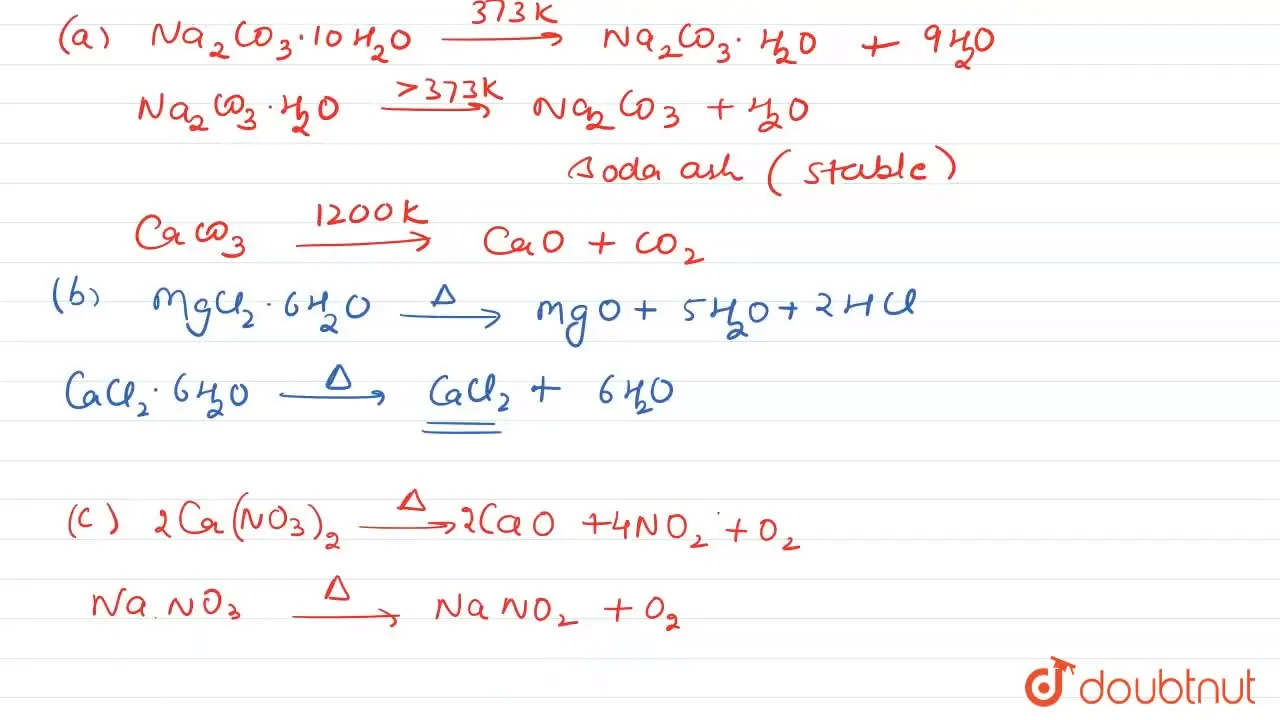Contrast the action of heat on the following with reason:
a. Na2CO3andCaCO3
b. MgCl2.6H2OandCaCl2.6H2O
c. Ca(NO3)2 and NaO3
Video Solution
Text Solution
(a). On heating, the decahydrate loses water of crystallisation to form monohydrate. Above 373K, they completely become anhydrous and become a powder.
Na2CO3.10H2O373K−−→Na2CO3.H2O+9H2O
NaCO3.H2Oabove−−−−−→373KNa2CO3(sodaash)+H2O
The Na2CO3 or soda ash is thermally very stable and does not decompose upon heating.
When CaCO3 is heated above 1200K, it decompose to evolve carbon dioxide.
CaCO31200K−−−→CaO+CO2
(b). When MgCl2.6H2O is heated, it decomposes to give magnesium oxide (MgO).
MgCl2.6H2O→MgO+5H2O+2HCl
The halide of calcium is hyproscopic. The CaCl26H2O get dehydrated upon heating.
CaCl2.6H2Oheat−−→CaCl2+6H2O
On this basis it is used as a dehydrating agent.
(c ). When calcium nitrate is heated, it decompose and forms the oxide.
2Ca(NO3)2Heat−−→2CaO+4NO2+O2
When sodium nitrate is heated strongly it gives nitrates and evolve oxygen.
2NaNO3Heat−−→2NaNO2+O2↑⏐⏐.
|
Updated on:21/07/2023
Related Playlists
- BOOK - CENGAGE CHEMISTRY ENGLISHCHAPTER - S-BLOCK GROUP 2 - ALKALINE EARTH METALSEXERCISE - Concept Application Exercise3videos
S-BLOCK GROUP 2 - ALKALINE EARTH METALS
- BOOK - CENGAGE CHEMISTRY ENGLISHCHAPTER - S-BLOCK GROUP 2 - ALKALINE EARTH METALSEXERCISE - Ex 5.1 Objective2videos
S-BLOCK GROUP 2 - ALKALINE EARTH METALS
- BOOK - CENGAGE CHEMISTRY ENGLISHCHAPTER - S-BLOCK GROUP 2 - ALKALINE EARTH METALSEXERCISE - Exercises Archives Subjective9videos
S-BLOCK GROUP 2 - ALKALINE EARTH METALS
- BOOK - CENGAGE CHEMISTRY ENGLISHCHAPTER - S-BLOCK GROUP 1 - ALKALI METALSEXERCISE - Archives Subjective8videos
S-BLOCK GROUP 1 - ALKALI METALS
- BOOK - CENGAGE CHEMISTRY ENGLISHCHAPTER - SOME BASIC CONCEPTS AND MOLE CONCEPTEXERCISE - Archives Subjective11videos
SOME BASIC CONCEPTS AND MOLE CONCEPT
Similar Questions
Na2CO3.10H2O is
View SolutionKCl.MgCl2.6H2O is a
View SolutionWrite the balance equation for the following
Action of heat on Na2CO3.10H2OView SolutionWhich of the following pairs can be distinguished by action of heat?
i. K2CO3 and CaCO3
ii. Na2CO3 and Mg(NO3)2
iii. Mg(NO3)2 and NaNO2View SolutionComplete the following equations :
CaCl2+Na2CO3→View SolutionGiving a suitable explanation for the contrast in the action of heat on the following: Na2CO3andCaCO3.
View SolutionCaCO3+………→CaCl2+H2O+……………
View SolutionFeCl3.6H2O is actually:
View SolutionWhat is the action of heat on Na2CO3.10H2O ?
View SolutionBalance the following equation :
NaHCO3→Na2CO3+H2O+CO2.View Solution


